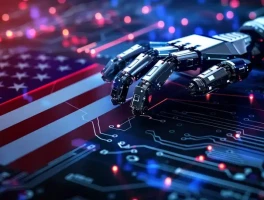The current technology news cycle is presenting a fascinating, if not jarring, set of dissonant signals. Reading the headlines feels like listening to two different songs playing at the same time, one a soaring orchestral piece, the other a somber dirge. In one ear, we hear Amazon's custom AI chip, Trainium, is seeing such "strong adoption" that it's now a "multibillion-dollar" business, sending shares of its supplier, Marvell Technology, climbing over 5%. In the other, we hear that Amazon is cutting its corporate workforce by approximately 14,000 roles.
This isn't just a simple case of one company's mixed fortunes. It's a clear signal of a much larger, more violent re-allocation of capital and talent across the entire sector. We are not in a simple downturn or a straightforward boom. We are witnessing a great divergence, where immense value is being created in highly specialized, almost esoteric corners of the market while the broader, more generalized corporate structures begin to atrophy. The data points, when viewed in isolation, are confusing. When synthesized, they paint a stark picture of an industry that is simultaneously building rocket ships in the garage while tearing down the living room to save on heating.
The Hyperspecialization Boom
The growth we're seeing isn't diffuse; it's concentrated and incredibly specific. Look at the demand for Amazon's Trainium processors. This isn’t about a new consumer gadget or a popular app. This is about the foundational hardware for machine learning—the picks and shovels of the AI gold rush. Amazon stating that its second-generation Trainium is "fully subscribed" is a powerful leading indicator. It suggests that the demand for raw AI compute power is so inelastic that a single custom silicon project can become a multi-billion-dollar enterprise almost overnight. This, in turn, buoys component suppliers like Marvell.
This trend extends beyond cloud infrastructure and into an even more capital-intensive domain: defense. The recent unveiling of Anduril Industries' ‘Ghost Shark’ autonomous undersea vehicle (AUV) in Sydney is another data point on this new map. Anduril isn't building software to optimize ad clicks; it's building a stealthy, AI-driven submarine. This is the definition of hyperspecialization. The 'Ghost Shark' represents a convergence of advanced sonar, artificial intelligence, and robust hardware designed for one of the most challenging operating environments on Earth.

I've looked at hundreds of these kinds of product announcements, and this one is unusual. It's not just an incremental upgrade; it’s a categorical leap. The market for such technology is small (essentially, national governments) but the budgets are enormous and the strategic value is nearly incalculable. This is where the smart money is flowing. It’s a bit like a powerful river being dammed and rerouted. The old, wide riverbed—representing generalized corporate spending and hiring—is starting to run dry. Meanwhile, a few newly carved, incredibly deep channels for AI infrastructure and autonomous defense are being flooded with a torrent of capital. The question this raises is a structural one: how stable is a market when its most dynamic growth is concentrated in so few, high-stakes verticals that are largely inaccessible to the broader economy? Are we simply trading one form of systemic risk for another?
The Generalist Contraction
While Anduril launches submersible drones and Amazon builds its AI empire, the other side of the ledger tells a different story. The same Amazon that can't make Trainium chips fast enough is also implementing a workforce reduction of around 14,000 corporate roles. Now, that number needs context. It’s a small fraction of their total global workforce—less than 1%, to be more exact, given their headcount of over 1.5 million. But the signal is far more important than the absolute number. The cuts are in the "corporate workforce," a telling descriptor for the very administrative and managerial roles that defined the growth of Big Tech over the last decade.
The language in these announcements is always calibrated for minimal alarm, speaking of "reducing in some areas and hiring in others." But the discrepancy between the areas of reduction and the areas of hiring is the entire story. They are not cutting back on the engineers who design custom silicon or the specialists who build AI models. They are trimming the fat from the corporate machine itself.
This pressure isn't isolated to the giants. Look at the more mundane corners of the tech world, like office technology. A recent Office Technology News Recap from The Cannata Report noted that Visual Edge IT, a major dealer, appointed three new executives amidst "questions, uncertainty, and more recent layoffs." This is the background radiation of the current market. While the headlines are dominated by AI breakthroughs and futuristic defense tech, the foundational B2B world of printers, IT services, and office solutions is facing a quiet consolidation. It's a world of lower margins and slower growth, and it’s the first to feel the squeeze when capital becomes more discerning. What happens to the vast ecosystem of companies that support the generalized corporate world when that world itself is contracting? And how many of those roles can be realistically re-skilled for a future that demands expertise in machine learning or autonomous systems engineering?
A Brutal Re-Allocation
The narrative that the tech industry is simply in a "downturn" is a gross oversimplification. It's not a recession; it's a reconfiguration. We're watching a live, high-stakes reallocation of resources, stripping capital and talent from generalized, bloated corporate structures and injecting it with fire-hose intensity into narrow, defensible, high-margin sectors. The era of "a rising tide lifts all boats" is definitively over. The new mantra appears to be "build a better boat, or learn to swim," because the tide is only rising in a few select harbors, and the rest of the ocean is getting choppy. The market is making its choices, and it's choosing specialized brains and autonomous brawn over just about everything else.

